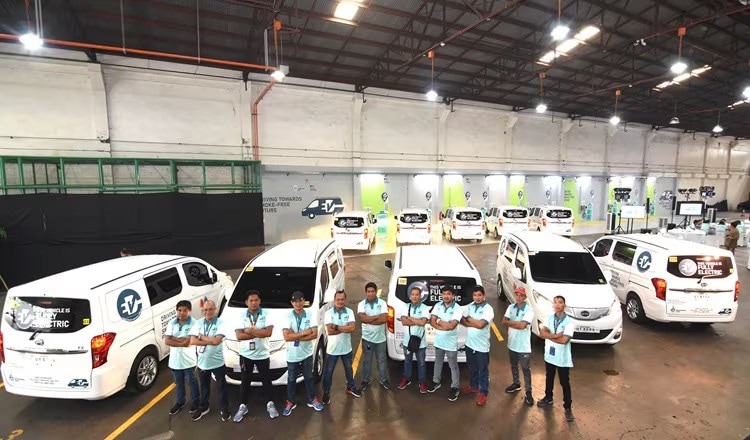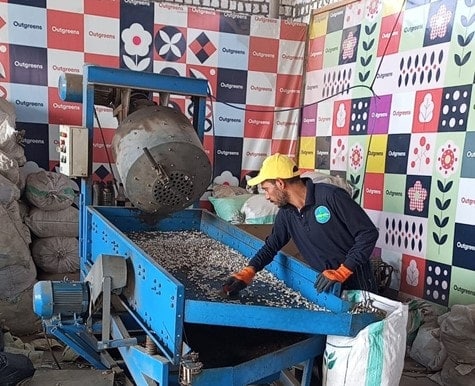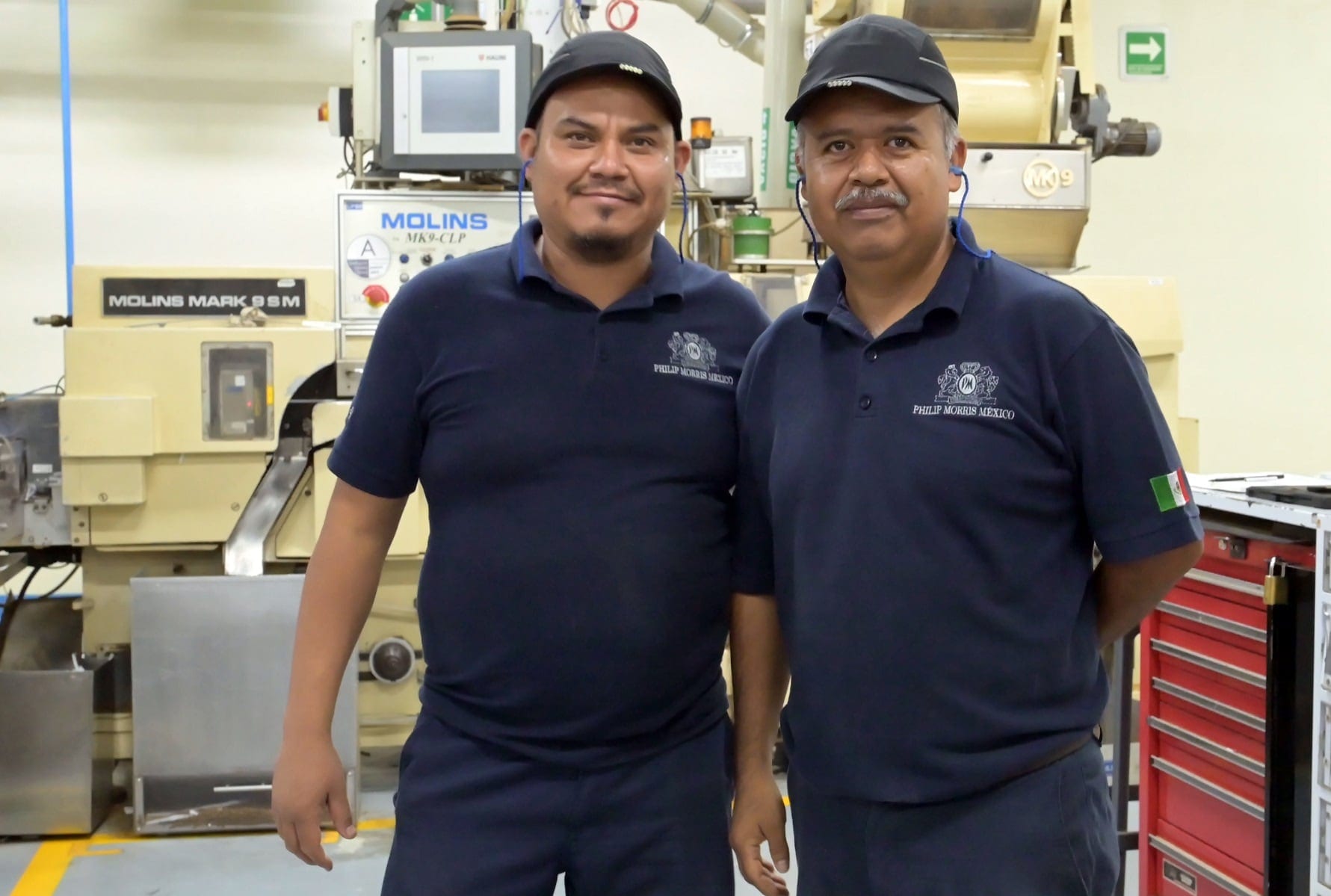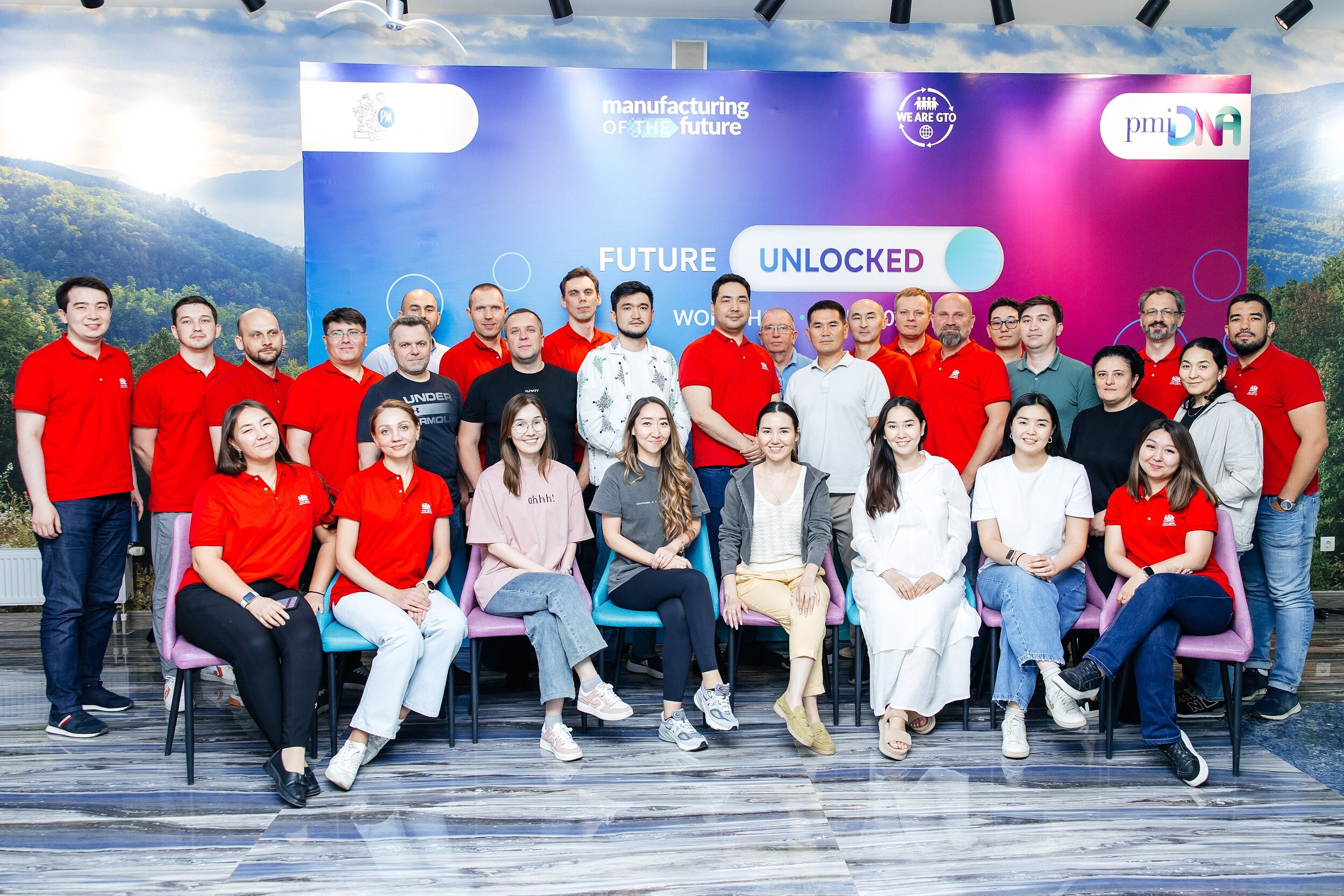The streets of Metro Manila are often congested, its air thick with smog from thousands of combustion engine-powered cars, buses, and aging delivery trucks. Commuters endure daily gridlock, while the steady hum of engines adds to the city’s worsening noise pollution.
Amid this backdrop, PMFTC, PMI’s affiliate in the Philippines, is forging its own path—electrifying its delivery fleet to help address urban pollution and reduce emissions, even as national policies and electric vehicle (EV) infrastructure continue to develop.
Pioneering change in a complicated landscape
While several Southeast Asian countries have made strides in EV adoption through government incentives and charging infrastructure, the Philippines has not yet caught up. Charging stations are scarce, regulatory support and incentives are limited, and awareness remains low as combustion-engine fleets continue to dominate the roads. In such an environment, many businesses shy away from making the switch, seeing it as an impractical and costly move.
Notwithstanding, PMFTC is pioneering an initiative by electrifying its fleet of delivery trucks. More than just a shift in transportation, the company’s investment in EVs is a concrete sign of commitment to tackle climate change even in an environment where such a shift remains challenging.
“PMFTC is one of the first companies in the country to integrate electric delivery trucks into its operations as part of its efforts to promote more sustainable trade practices,” said Tyrone Uy, Manager Procurement Cluster PH, TH, VN, IN & BD. “We hope this bold step inspires others to follow suit, amplifying the collective impact of reducing corporate carbon footprint.”
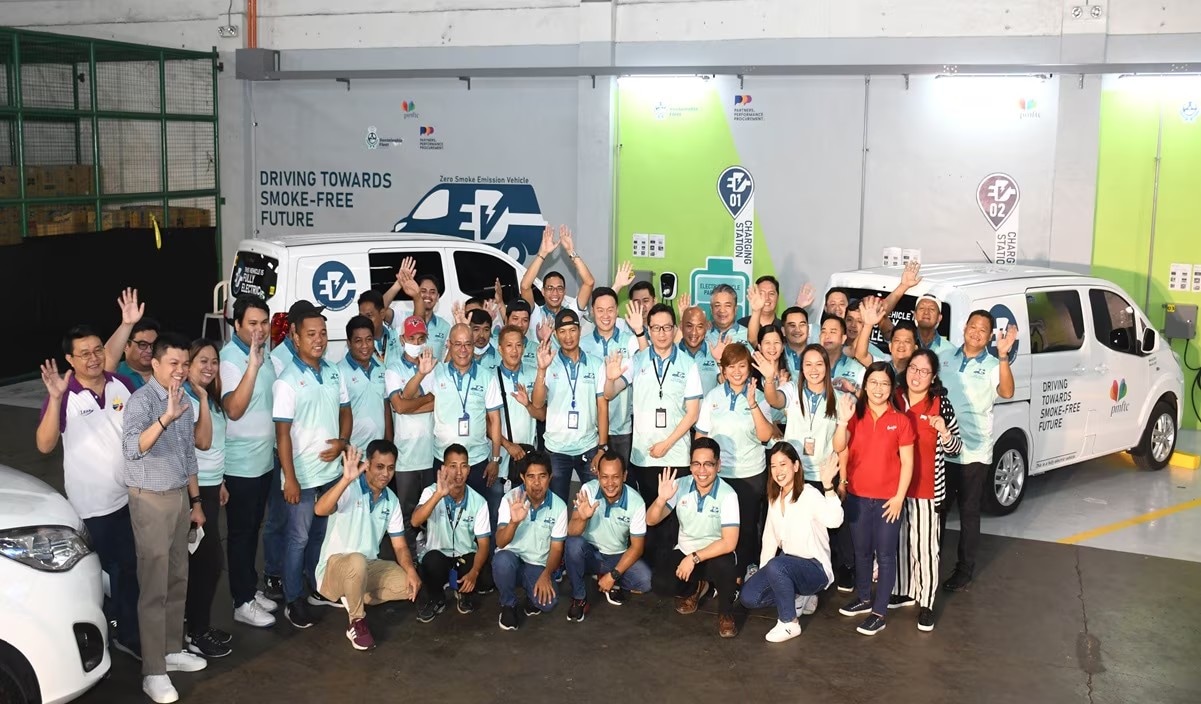
Image: PMFTC Inc. deploying its first 10 electric vehicles (EVs) as part of its service fleet in 2023.
PMFTC’s journey toward fleet electrification began in 2023 with the introduction of just 10 fully electric delivery trucks. Since then, the company has made remarkable progress, rapidly scaling up to 106 pure battery electric delivery trucks as of July 31, 2025. In parallel, PMFTC has also deployed 359 hybrid vehicles for employee benefit and work tool use, further reinforcing its commitment to reducing carbon emissions. The decision to electrify its fleet was a strategic move together with the Fleet Center of Excellence to confront the reality that corporate fleets account for a significant portion of the company’s scope 1 carbon footprint.
In 2023, PMI’s fleet vehicles made up 25 percent of PMI’s total scope 1 carbon footprint, highlighting the urgency of change. Transitioning this segment became a critical milestone in PMFTC’s broader roadmap to achieve carbon neutrality in relation to scope 1 and scope 2 emissions1 by 2025 and net zero GHG emissions in our value chain (scope 1, 2, and 3) by 2040.
“In combination with our efforts in driver’s safety and efficiency training, as of the first half of 2025, PMFTC has already reduced transport-related carbon emissions per kilometer by 40 percent,” shared Dean Acabo, PMFTC’s Security and Market Safety Manager. “This achievement reflects the strong support of our management team and their unwavering commitment to a more sustainable and responsible business model. By prioritizing the electrification of our delivery fleet, they’ve demonstrated a clear understanding of the importance of reducing our environmental impact. It’s a testament to how strategic leadership and bold action can drive meaningful change—even in challenging environments.”
Building infrastructure from the ground up
One of the biggest hurdles to EV adoption in the Philippines is the lack of public charging infrastructure. Unlike countries with public charging networks, Filipino EV users—especially businesses—must build their own solutions from the ground up.
To address this challenge, PMFTC responded by developing its own network of charging stations at key sales facilities and logistics hubs—ensuring both operational efficiency and the long-term viability of the EV transition.
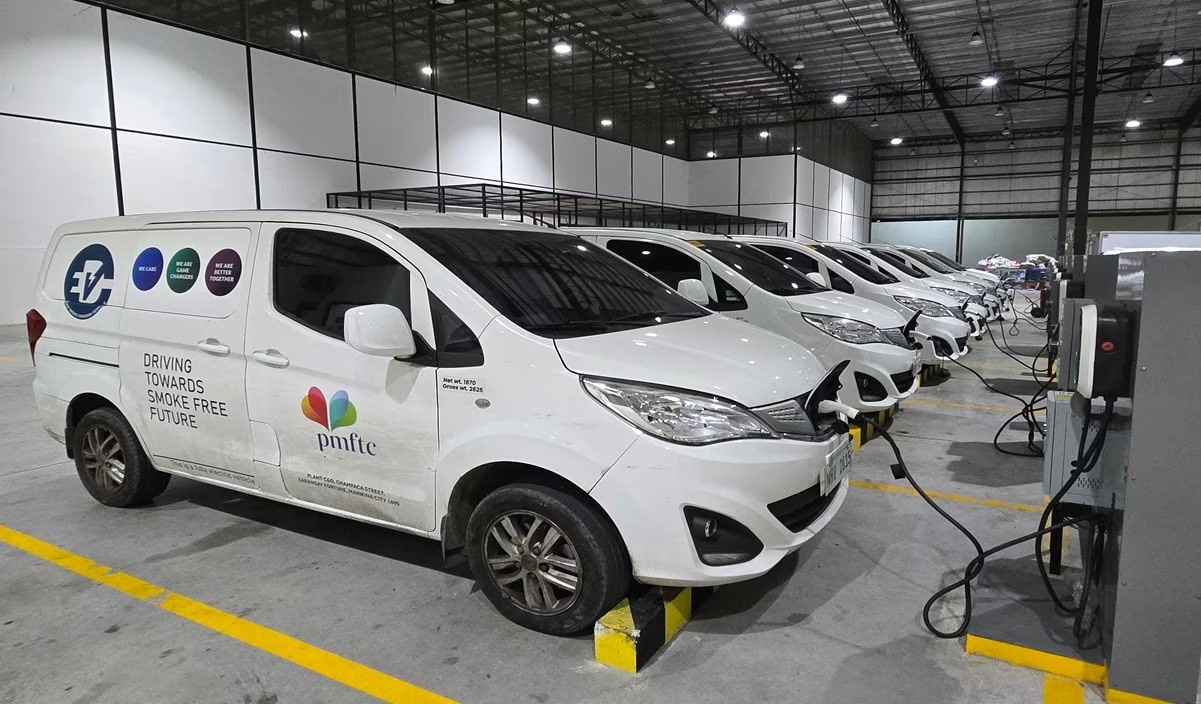
Image: Electric vehicles and charging stations at a PMFTC Inc facility.
“We are fully committed to supporting these sustainability strategies,” said Herminwi Herminwi, Director Commercial Operations PMFTC. “Across PMI and PMFTC, we are working to transition our combustion-engine company and fleet vehicles to hybrid or fully electric alternatives. This ensures that every part of the organization is actively contributing to our sustainability strategy. Even in the face of infrastructure and regulatory challenges, we remain steadfast in our dedication to progress and to building a cleaner, more resilient future.”
Transforming how we deliver in the Philippines
Words appear on screen:
Transforming how we deliver in the Philippines, one vehicle at a time
Music starts.
Voiceover begins:
In the Philippines, especially in Metro Manila,
traffic congestion is a major urban challenge.
The heavy traffic not only leads to frustratingly long commutes,
but also contributes to severe air pollution.
This impacts human health and the environment,
accelerating climate change and depleting natural resources.
PMFTC recognizes this.
We recognize the urgency of addressing environmental challenges.
That's why we are committed to playing
our part in driving meaningful change.
Eduardo Tsang, Former Finance Director PMFTC, Inc., speaks to camera:
PMFTC's journey to sustainability started with the introduction
of safety programs and cost efficiency initiatives.
Now the introduction of the electronic vehicle program
actually did help a lot in meeting these objectives.
Yohan Lesmana, Former Sales Director PMFTC, Inc., speaks to camera:
We are doing our best.
We are fully committed to support these
sustainability efforts and strategy.
That's why right now today we push the
envelope despite all the challenges.
Dean Acabo, Manager, Security & Market Safety, PMFTC, Inc., speaks to camera:
At PMI, around 26% of our direct emissions of
CO2 come from our fleet operations.
And we have recently established a joint effort to help enable our
commitment of reducing our carbon emissions by 10% year by year.
Jophet Viloria, Retail Sales Assistant PMFTC, Inc., speaks to camera:
Since I got an electric vehicle,
the first thing I noticed is how comfortable it is.
Unlike the previous one which is manual,
so it was more tiring to drive.
This electric vehicle is less hassle.
You don't need to go to gas stations to refuel.
And it's eco-friendly, no emissions.
The electric vehicle makes a great contribution
to the company's program to become carbon-neutral by 2025.
Herminwi Herminwi, Sales Director, PMFTC, speaks to camera:
So, we really look forward to implement more programs
in the coming years to ensure we contribute
more to a greener and sustainable environment.
In 2024-25, we are looking at expanding to increase 55 more electric vehicles.
With the collective contributions of everyone,
we are better together.
We are transforming on how we deliver in
the Philippines one vehicle at a time.
Philip Morris International's logo appears on screen.
Words appear on screen:
Delivering a better, smoke-free future.
Music ends.
Note: In 2023, PMI’s fleet vehicles made up 25 percent of its total scope 1 carbon footprint.
The company’s move is not just about business efficiency—it is about creating a model for how sustainability can work in a country where the needed infrastructure is still in development. PMFTC’s approach demonstrates that electrification is achievable even with limited external support.
Employees are already feeling the immediate impact of this transition. Jophet Viloria, Retail Sales Assistant at PMFTC, shared his experience: “Since I was assigned an electric vehicle, the first thing I noticed was how comfortable it is compared to the old one. My previous vehicle was manual, which was more tiring to drive. Now, it’s smoke-free and less of a hassle—I don’t need to stop at gas stations anymore. Plus, it does not pollute while driving. The electric vehicle makes a meaningful contribution to the company’s goal of becoming carbon-neutral by 2025.”
From pilot to scale: Driving transformational change
In a market still waiting for policy shifts and infrastructure improvements, PMFTC is not staying idle. Instead, the company is proving that businesses can design and implement conditions to make meaningful change, reduce its carbon footprint, and create long-term value for the business and the communities it operates in.
PMFTC’s fleet electrification journey has accelerated at an extraordinary pace. From a modest start of just 10 electric delivery trucks in 2023, the company has now deployed a total of 466 electric or hybrid vehicles, This momentum continues, with 18 additional hybrid vehicles scheduled for deployment by the end of 2025, further expanding the company’s low-emission fleet and deepening its commitment to sustainable mobility. “We really look forward to implementing more programs in the coming years to ensure we contribute to reducing the environmental impact of our business,” Herminwi added. “With the collective contributions of everyone, we are transforming how we deliver in the Philippines—one vehicle at a time.”
¹Scope 1: Emissions from operations that are owned or controlled by the reporting company. Scope 2: Emissions from the generation of purchased or acquired electricity, steam, heating, or cooling consumed by the reporting company. Source: Greenhouse Gas Protocol
Disclaimer: This market story should be read in conjunction with Integrated Report 2024 and the 2024 FY actuals for selected EHS data:

